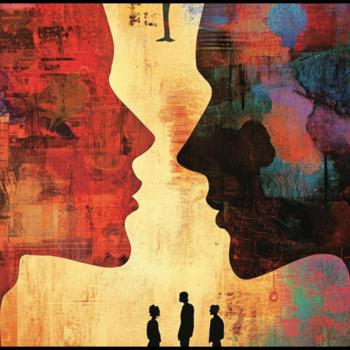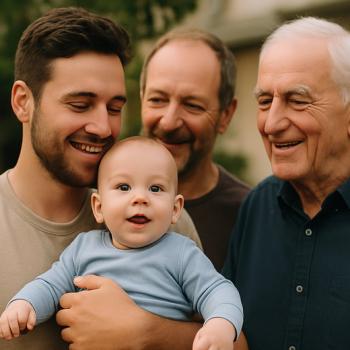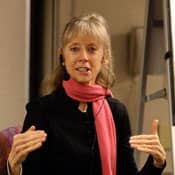We've been examining the difference between being judgmental, which often involves a keen sense of blame, and discernment, which is an intuition about what is or is not true, useful, or helpful. The feeling of being judgmental is sharp, often cutting. When we're judgmental, we automatically put someone (or ourselves!) out of our heart. Judgmentalness is all about separating ourselves from the person or situation we are judging. And almost always, the thing we judge in another is something we prefer not to look at in ourselves. Often, our feelings of judgment are actually conditioned reflexes that we picked up from our parents and teachers. They often come from having been judged ourselves.
Discernment, on the other hand, is our natural instinct to recognize the path that leads to real freedom and compassion in any moment. Discernment can be a strong No to something that feels wrong or murky, but it has a compassionate clarity about it. Discernment doesn't judge. It simply recognizes and moves forward. And it doesn't exclude someone from the heart.
When we're trying to recognize the difference between judgment and discernment, it's often helpful to recognize the feelings that come up in us when we are judging ourselves or another situation. Then we can begin to work with them, and tease out the threads of our discerning intuition from the habits of the judgmental mind.
Of course, when we've pushed away our feelings for a long time, they become hard to recognize and even harder to interpret. That's why it so often it takes a crisis, a meltdown, to get the false self to abandon its defenses long enough to hear the messages our feelings want to give us.
The Fault Lines
When I was in my early twenties I was married to a man who worked in the film business. Making films involves months of 18-hour days, often in strange places, and since I was a journalist, and my profession was theoretically portable, it seemed to make sense that I should travel with him. In practice, however, that meant that I often found myself sitting in hotel rooms, waiting for my husband to come home. I hated the powerless feeling this gave me, but at the same time, I was too emotionally dependent on my husband to stay away. In my conflicted state, I would pick fights, and the fights would escalate, and eventually we would find ourselves locked in a struggle to prove the other wrong.
One day, I had to leave for an interview right in the middle of a particularly intense argument. Mega waves of anger were running through me, and what was even worse was my confusion—the issues behind the conflict were so murky that I couldn't figure out which of us was wrong!
But I didn't have time to obsess about it. I had to do the interview. I watched myself slip out of the emotions that were consuming me, and slip into my professional self. As I considered the questions I was going to ask, I actually forgot about my anger.
When the interview was over, I noticed that I was still standing outside my anger. At that moment, I realized that I had a choice. I could re-enter the zone of anger, the zone of he-did-this/I-did-that, or I could stay in this zone of relative objectivity, and consider the situation from a different perspective.
I chose objectivity. I asked myself, "Why does it matter so much that you be right?" Almost immediately an answer arose: "Because I don't believe that I can change. So if I admit a mistake, it's like admitting that I'm permanently flawed."
"Why is that so terrible?" I asked.
There seemed to be no answer to that question—only a feeling of fear and despair. That feeling felt huge, primal. As I let myself feel it, I saw that in some way it was controlling my life, and that I did not want to live inside that feeling any more. Whatever it took, I knew I had to pull myself out of this swamp of pain.
That realization was a true turning point in my life. In hindsight, I'd say that it marked the beginning of my inner journey, starting a process of self-questioning that led me, two years later, into meditation. At the time, though, the most immediate result was a feeling of compassion both for me and for my husband. There was no longer any question of blame. We were just two human beings on different life trajectories, struggling to stay together when it was obvious that we were moving in nearly opposite directions. My problem, I saw, was not him. It was the fact that I was out of touch with my real self.
Over the years, as meditation and inner practice have made me familiar with my own ground, the self that lies behind the masks, it's become much easier not to blame. That choice always presents itself, of course. When the feeling that 'Something's wrong' surfaces, I can let the discomfort propel me into the old scripts ("Who's fault is this?" "What have I done wrong?" "How can these people act that way?"). Or I can stop, recognize the discomfort as a signal to pay attention, and ask, "What am I supposed to understand here?" or "What is this feeling telling me?" or simply, "What's behind this feeling?" If I take the first road, I inevitably find myself saying or doing something that comes out of the ego's fearful need to prove itself right. The result is often painful and always ineffectual. If I take the second road, I experience a clarity that lets me act intuitively, that seems to come from beyond my personal self. When I act with discernment, it's often because I've resisted the tendency to blame.





